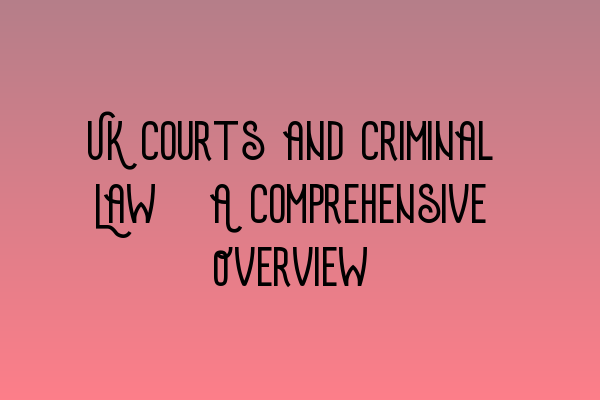UK Courts and Criminal Law: A Comprehensive Overview
In the United Kingdom, the courts play a crucial role in the administration of justice, particularly in the realm of criminal law. Understanding the structure and functions of the UK courts system is essential for any aspiring lawyer or legal professional. In this article, we will provide a comprehensive overview of the UK courts and their role in criminal law cases.
The UK Courts System
The UK courts system is hierarchical, with different courts having varying degrees of authority and jurisdiction. At the apex of the system is the Supreme Court, which is the final court of appeal for all legal disputes in the UK. Situated just opposite the Houses of Parliament in London, the Supreme Court hears cases of national importance and constitutional significance.
Beneath the Supreme Court are two main types of courts: the appellate courts and the lower courts.
The Appellate Courts
The appellate courts in the UK consist of the Court of Appeal (both the Criminal Division and the Civil Division) and the High Court. The Court of Appeal hears appeals against decisions made by the lower courts, ensuring that justice has been correctly administered and errors have not been made. It serves as an important check and balance within the UK courts system.
The High Court, on the other hand, has both appellate and original jurisdiction. As an appellate court, it hears appeals from lower courts in certain circumstances. In its original jurisdiction, the High Court handles high-value and complex cases, often involving a significant point of law.
The Lower Courts
The lower courts in the UK deal with the majority of criminal law cases. These include the Magistrates’ Court and the Crown Court.
The Magistrates’ Court is the first point of entry for most criminal cases. It handles minor criminal offenses, or “summary offenses,” which are less serious in nature. Magistrates, who are laypeople and not professional judges, preside over cases in the Magistrates’ Court. They primarily determine guilt or innocence and impose sentences or fines.
For more serious offenses, the case is usually transferred to the Crown Court. The Crown Court is presided over by professional judges, including Circuit Judges and High Court Judges. It deals with more severe criminal offenses, such as robbery, murder, and drug trafficking. In the Crown Court, a jury of 12 members decides on the guilt or innocence of the accused, while the judge is responsible for sentencing if the defendant is found guilty.
The Role of the UK Courts in Criminal Law
The UK courts play a crucial role in the administration of criminal law. They ensure that justice is served by ensuring fair trials, upholding the rule of law, and imposing appropriate sentences.
In criminal law cases, the courts have the power to decide guilt or innocence based on the evidence presented, evaluate witness statements, and determine the credibility of witnesses. They also interpret and apply relevant statutes and legal principles to ensure that defendants are prosecuted fairly and in accordance with the law.
The courts also play a vital role in imposing sentences upon conviction. They consider various factors, such as the seriousness of the offense, the defendant’s criminal history, and any mitigating or aggravating circumstances, to determine appropriate punishments. Sentencing options can range from fines and community service to imprisonment, depending on the gravity of the offense.
Conclusion
The UK courts system is a complex structure that plays a fundamental role in the administration of criminal justice. From the Supreme Court to the Magistrates’ Court, each level of the hierarchy has a specific function in upholding the rule of law and ensuring fair trials for all individuals accused of criminal offenses.
If you are interested in learning more about criminal law and preparing for the SQE 1 or SQE 2 exams, we offer comprehensive preparation courses to help you succeed. Check out our SQE 1 Practice Exam Questions and SQE 1 Practice Mocks FLK1 FLK2 articles for valuable resources to enhance your study experience. For exam schedules and important dates, view our SRA SQE Exam Dates page.
